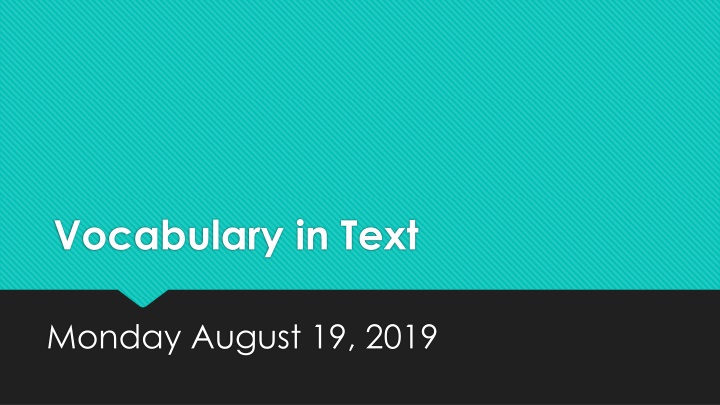
Literal and Non-Literal Language in Vocabulary Learning
Dive into the concept of literal and non-literal language in vocabulary learning, with explanations, examples, and the importance of word knowledge. Explore how to determine the meaning of unknown words and enhance reading comprehension skills.
Download Presentation

Please find below an Image/Link to download the presentation.
The content on the website is provided AS IS for your information and personal use only. It may not be sold, licensed, or shared on other websites without obtaining consent from the author. If you encounter any issues during the download, it is possible that the publisher has removed the file from their server.
You are allowed to download the files provided on this website for personal or commercial use, subject to the condition that they are used lawfully. All files are the property of their respective owners.
The content on the website is provided AS IS for your information and personal use only. It may not be sold, licensed, or shared on other websites without obtaining consent from the author.
E N D
Presentation Transcript
Vocabulary in Text Monday August 19, 2019
RL3.4: Determine the meaning of words and phrases as they are used in a text, distinguishing literal from nonliteral language. I CAN FIGURE OUT THE MEANING OF WORDS AND TELL THE DIFFERENCE BETWEEN LITERAL AND NON-LITERAL LANGUAGE WHEN I READ.
PRIOR KNOWLEDGE WHAT CAN WE USE TO HELP US DETERMINE THE MEANING OF UNKNOWN WORDS? WHAT IS LITERAL LANGUAGE? WHAT IS NON-LITERAL LANGUAGE? WHY IS VOCABULARY IMPORTANT WHEN READING?
VOCABULARY PRINCIPAL: THE LEADER OF A SCHOOL SOARED: FLEW UPWARD STROLLED: WALK SLOWLY WORRIED: UNEASY OR ANXIOUS PROUD: PLEASED WITH YOURSLEF OR SOMEONE ELSE ANNOUNCED: TO MAKE KNOWN FINE: VERY NICE CERTAINLY: SURELY OR TO BE SURE
REAL LIFE APPLICATION WITHOUT WORDS, WE WOULDN T BE ABLE TO TALK ABOUT PEOPLE, PLACES, THINGS, OR ACTIONS WORD KNOWLEDGE IS IMPORTANT BECAUSE IT HELPS STUDENTS UNDERSTAND WHAT THEY ARE READING ONCE VOCABULARY IS LEARNED IT IS STORED IN YOUR MEMORY MULTIPLE EXPOSURE TO VOCABULARY IS NECESSARY TO LEARN IT WELL
LITERAL LANGUAGE VS. NON-LITERAL LANGUAGE LITERAL LANGUAGE MEAN EXACTLY WHAT IT SAYS. To be literal is to state what you mean or mean what you say. For example: If I tell you to, Stop whining! I mean it literally, Stop whining. as in Stop whining and put a smile on your face, please. I am directly stating what I mean.
NON-LITERAL LANGUAGE NON-LITERAL LANGUAGE MEANS NOT TRUE. YOU DON T MEAN WHAT YOU SAY. For example: If I tell you, Let s go chill, I m not suggesting we get into the freezer.
Lets Practice Mrs. Smith s garden is growing well because she has a green thumb. Is this phrase literal or non-literal?
Lets Practice My mom took us to the circus. Is this phrase literal or non- literal?
Lets Practice Our old car is on its last legs. Is this phrase literal or non-literal?
I DO Mom spent all day working in the garden. She felt weary and just wanted to go to bed. The word weary means: A. tired B. sick C. hated D. annoyed
We Do Please be careful with that vase. It is made of glass and quite fragile. What does the word fragile means: A. useful B. empty C. beautiful D. easily broken
Next, we are going to read A Fine, Fine School and then complete an exit ticket (You Do).
Vocabulary in Text Tuesday August 20, 2019
RL3.4: Determine the meaning of words and phrases as they are used in a text, distinguishing literal from nonliteral language. I CAN FIGURE OUT THE MEANING OF WORDS AND TELL THE DIFFERENCE BETWEEN LITERAL AND NON-LITERAL LANGUAGE WHEN I READ.
PRIOR KNOWLEDGE WHAT CAN WE USE TO HELP US DETERMINE THE MEANING OF UNKNOWN WORDS? WHAT IS LITERAL LANGUAGE? WHAT IS NON-LITERAL LANGUAGE? WHY IS VOCABULARY IMPORTANT WHEN READING?
VOCABULARY PRINCIPAL: THE LEADER OF A SCHOOL SOARED: FLEW UPWARD STROLLED: WALK SLOWLY WORRIED: UNEASY OR ANXIOUS PROUD: PLEASED WITH YOURSELF OR SOMEONE ELSE ANNOUNCED: TO MAKE KNOWN FINE: VERY NICE CERTAINLY: SURELY OR TO BE SURE
REAL LIFE APPLICATION WITHOUT WORDS, WE WOULDN T BE ABLE TO TALK ABOUT PEOPLE, PLACES, THINGS, OR ACTIONS WORD KNOWLEDGE IS IMPORTANT BECAUSE IT HELPS STUDENTS UNDERSTAND WHAT THEY ARE READING ONCE VOCABULARY IS LEARNED IT IS STORED IN YOUR MEMORY MULTIPLE EXPOSURE TO VOCABULARY IS NECESSARY TO LEARN IT WELL
Literal Vs Non-Literal * Remember literal language means exactly what it says. Non-literal language does not mean what it says.
Lets Practice: Determine if the phrase is literal or non-literal These new shoes cost a arm and a leg. Is this phrase literal or non- literal?
After the football game, it was time to hit the hay. Is this phrase literal or non- literal?
The students ate lunch in the cafeteria. Is this phrase literal or non-literal?
On the first day of school, I had butterflies in my stomach. Is this phrase literal or non- literal?
San Francisco 49ers is my favorite football team. Is this phrase literal or non- literal?
I DO As Jake struggled to solve the problems on the test, it became apparent that he had not spent enough time studying. What does the word apparent mean as it is used in the sentence? A. sad B. clear C. lonely D. mysterious
We Do Everyone had a good time at the picnic. The games were fun and the food was plentiful. In fact, there was so much food they had to take some home. What does the word plentiful mean as it is used in the sentence? A. parts B. plates C. a lot of D. ice cream
Next, we are going to read A Fine, Fine School and then complete an exit ticket (You Do).
